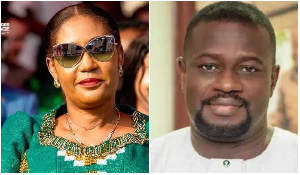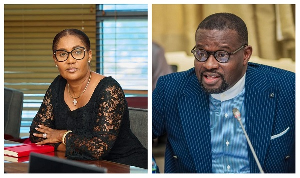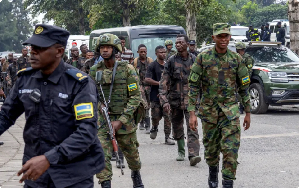--Ghana’s development beyond 2015
Today 9/11/2014, the Minister of Finance Seth.E Terkper presented his Budget Speech to Parliament stating the budget statement and economic policy for the 2015 financial year. Whilst one welcomes his speech and thank him for the comprehensive statement there seems to be areas of unmet needs, which need to be unpicked in his statements.
In trying to unpick these areas I have identified critical key areas still needing clarifications.
The Minister pointed out that, “ at the basic level as the country approach the 2015 target year for the Millennium Development Goals we can all be pleased that Ghana has achieved MDG2 on universal basic education”. What exactly does he means about this and I quote, “ In order to avoid complacency and in line with our own FCUBE programme, Government will continue to implement interventions aimed at retaining our children in school such eliminating schools under trees, free uniforms, free text books, capitation grant expanded school feeding programme, BECE subsidies and re deployment of teachers. He also mentions that teacher absenteeism is down from 27% to 11%.
Could he possibly give us a breakdown of this? How can this be demonstrated in fiscal terms.
What is surprising is that there was no mention of working towards the UN convention of Children human rights for all children to be educated in a purposeful accommodation. There was no set target date in his statement as to when the Government would give vulnerable children their basic right of being educated in purposeful accommodation.
The Finance Minister only made reference to 800 orphans as “the weak and vulnerable” and said provision made for their shelter, and trained 1,406 care givers in all 10 regions and assisted in reuniting of 983 children. Is this the actual figure of the number helped so far out of what percentage of children from vulnerable group.
He appeared to have a narrow view about the range of people in the vulnerable children category and the wider determinants of health. He only mentioned 800 orphans as weak and vulnerable in our society. Is this his understanding of the vulnerable group? Who then is responsibility for those remaining who may have severe learning disabilities, mental health problems, special needs children needing one to one tuition and many more?
The listed vulnerable group could be added to his list of the weak and vulnerable group.
? All children being educated under the tree with no risk assessment done annually / quarterly as a result we an increased rate of absenteeism from school due to weather conditions and low morale and self-esteem and other socio-economic issues.
? Confused, depressed, young people with drug and substance abuse issues and it impact on children in that environment.
? Children and young people being denied any form of education because they live in remote villages and there is no provision made in his budget for such children because they don’t fit in the wealk and vulnerable group of orphanage.
? Young people working as Kayakaya girls in city centers.
? Homeless families living in Shanty towns for example, Ashiama, Sodom and Gomorrah etc
? Hard to reach families needing extra that help with health promotion activities for a life style change
? Vulnerable children of migrants African families begging on our High streets
? Children who have a parent or both in prison with no help from extended families
? Young men who are practicing homosexuality and been despised by families and society
? Children living on the farms with no school provision each day .
As the Minister can clearly see there are more than in this category of “weak and vulnerable” group of people.
Education:
On the educational front, The Minister highlighted that the President has pledged to construct additional 200 Senior High Schools by 2016 and is very much on course. He also said so far the first 50 are at various stages of completion and hinted that the current budget has also made provision for the next 50. Plus under the World Bank supported Secondary Education Improvement Project (SEIP), an additional 23 new Senior High Schools are being constructed. In conclusion he reported that this meant that so far funding has been secured for 123 out of the promised 200 Senior High Schools.
He seems confident that in meeting target set by 2016, which he claims, is in line with our prudent fiscal policy that all major capital projects must be fully funded before they are started. Finally, he pointed out that still under the SEIP, 125 existing Senior High Schools are receiving facilities upgrade, 125 Heads are receiving Leadership and Management training, an additional 6,500 Science, Mathematics and ICT Teachers are receiving capacity building while scholarships are being provided for 10,000 students for their entire 3 year Senior High School duration for which 60% are girls.
The above-mentioned progress is great news however my concerns is that we must equally investment in early years education so the under the tree form of education could completely be stopped. Is Parliament going to unpick the budget statement as one sees that little investment around early years education have been mentioned. My background as senior health visitor who have had further studies in childhood development at Master’s level have raised my concerns as to how the Government plans to tackle inequality that exist in Ghana if we fail to address and challenges that often occurs in early childhood. Knowing that the formation in early years through education is crucial. This is because investing in Early Child Development programme are numerous and inherited. A child’s ability to think, form relationship, and live up to his/her full potential is directly related to the synergistic effect of good health, good nutrition, and appropriate stimulation and interaction with others.
It is right for the Government to invest in Senior High Schools and above but without the foundation of early years education we would not yield any quality outcomes in the end. The Government may find that a large body of research has proven that the importance of early brain development and the need for good health and nutrition. I am sure that the Minister of Finance is also aware that most Ghanaian mothers are mainly the head of their homes therefore they need a safe child care education. Surely addressing the intersecting needs of women and children is equally paramount. This needs does not come across in his budget. Hence why I am questioning, probing and challenging his budget statement.
Social Development Programme
Although the Finance Minster mentioned that progress made to tackle extreme poverty more needs to be done to benefit children and families. If our Government wants to achieve the United Nations Millennium Development Goal then we would need to adopt the Every Child Matter Ethos and Children Act 2004 which underpins what we are trying to achieve in addition have a budget for child protection to get the right staff with specific training in child protection, safeguarding policy and these would be used in conjunction with the Livehood Empowerment Against Poverty (LEAP) programme. Whilst one most people would welcome the electronic payment of the LEAP Grants in the 3-piloted ecological zones one feels more early intervention is needed to help the vulnerable group in our society.
The Minister seems to have developed M&E Framework and Manuals for the LEAP to track progress, identify gaps and design timely interventions for
Implementation. However this document needs to be user friendly so that service users can also have a version in Twi, Hausa, Ga etc. Thus giving the service users a voice and also channel complains if the service is not meeting expectations. The process would then need to be monitored, reviewed evaluated and to help an effective service delivery.
Indeed more needs to be done in expanding the implementation of the LEAP to cover more and more households’ beneficiaries in order to improve their socio-economic status and ensure the survival and development of children as well as to promote the welfare of the vulnerable and excluded in society. However itt would also be an opportunity to perhaps introduce a form of child benefit for struggling parents to alleviate the pains and suffering often these group go through in his budget. Child benefit system is used in Britain and has helped British children and families including some immigrants who falls on hard times whilst here and so qualify. In addition they have food bank in every community to help those needing extra help. In contrast, Ghana who is an under developed/or developing country like ours does not seem to have a provision in its budget statement for these group of vulnerable group who could really do with a little bit of help as the cost of living sours.
Conclusions:
If need to invest the same amount that we invest for High school for early years education with purposeful playgrounds this would prepare children for school and help in improving their performance and reducing the need for repetition. Children needs healthy cognitive and emotional developments in their early years and this translates into tangible economic gains for a country. Therefore developing policies that seeks to remedy deficit incurred in the early years are much more costly than initial investment in the early years. The focus must also be in heavy investment in early years thereby offering of free nursery placement for all our children from 3 –5 years before they start schools.
Opinions of Thursday, 20 November 2014
Columnist: Bolus, Mercy Adede


















